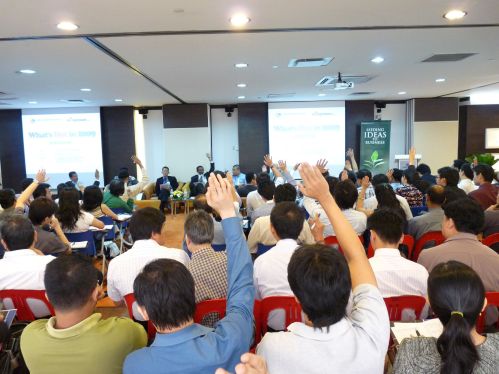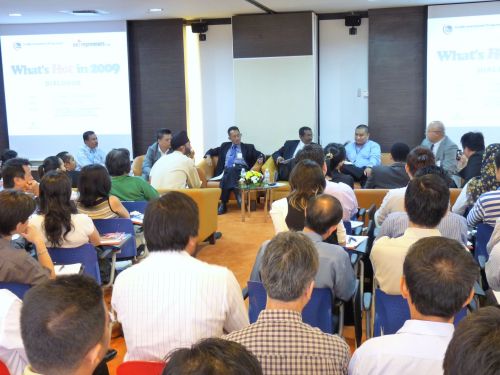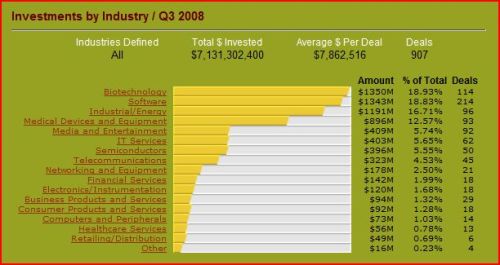Note: This article was published in ‘The Edge Malaysia’, Malaysia’s leading business weekly on 20th July 2009 in my column entitled “Money & Entrepreneurship”.
Malcolm Gladwell tells a great story. His book, “Outliers” must be one of the best business books of 2008. The basic premise of his book is that people are successful not because of some great talent that they have or because they have very high IQs but because of the opportunities that they had, of being in the right place at the right time.
Take Bill Gates for example. How did he create Microsoft and end up being the richest man in the world? He’s brilliant, yes but so are thousands maybe tens of thousands of people in the USA, but why him? According to Gladwell, Gates was lucky enough to be born in 1955 which meant he was in his teens just when the computer revolution was taking shape. His parents were wealthy and because he was a bright child who got bored in public school his parents put him in an elite private school, Lakeside. It just so happens that in 1968, just when he joined Lakeside, the school bought a sophisticated computer terminal, the ASR-33 Teletype with a direct link to a mainframe in downtown Seattle. As owning an ASR and buying time on a mainframe was very expensive in those days, Gates was fortunate indeed to be at Lakeside. Hence he began programming at the ripe old age of 13, when most other teenagers were more concerned with pimples and hairspray.
Then, because Lakeside had a computer club he was given the opportunity of testing software developed by Computer Center Corporation a spinout of the University of Washington. He went on to do more computer work at the University, which had one of the more sophisticated computers in the US at that time. All of these honed his computer and programming skills which came in pretty handy in starting Microsoft.
His other great opportunity was his introduction to IBM. As Chairperson of the United Way Charity his mother Mary Gates met John Akers the CEO of IBM who mentioned that IBM needed someone to write the software for an operating system. She introduced her son Bill to Akers and Gates was given the job of writing the operating system for IBM, which was the beginning of the Windows operating system.
The final great opportunity that Gates had was that IBM was not insightful enough to keep the rights to the software that Gates developed for them. The thinking at that time was that hardware was more important than software and software had little value. IBM gave up the software to Gates and that was the final piece of the puzzle for Bill Gates.
Had Gates been born at a different time or went to a different school or if his private school did not have the ASR or if his mother had not met Akers or if IBM had decided to keep the IP rights to the software, there would be no Bill Gates the richest man in the world. Gladwell does not say this is luck, but the creation of the right opportunities is whats important.
That brings me to Malaysia and the Outlier principle. Perhaps we are not as successful in technology not because we don’t have the right skills or policies but perhaps we did not have the right opportunities and our timing was less than perfect.
Had Dr. Mahathir created the Multimedia Super Corridor in say 1986 instead of 1996, then perhaps Malaysia would be a great success today. The year 1996 was far too late to enable the creation of a technology industry, as it was at least two decades behind the US. The best of times for the technology industry when the giants of the industry like Microsoft, Dell, Amazon, Yahoo and many others were created was in the 1980s and early 1990s. The timing for the MSC was also bad because immediately after its launch the Asian Financial Crisis hit the region in 1997. It took 2 years for the region to recover and then disaster struck again with the “Dotcom Bust” in 2000. Then in 2001 we had the 9-11 terrorist attacks and again the global economy was hit. By the time Malaysia recovered from all these problems the opportunity to make it big in technology was lost.
Companies were also affected by all these economic turmoil. Many MSC companies were started in 1996 to 2000 and there was a tremendous buzz about the community, despite the 1997 Financial Crisis. However, the Dotcom Bust dealt a severe blow to fund raising for technology companies and many of the foreign Venture Capital firms that were investing in this region returned home. This curtailed funding and stopped the formation of larger technology companies. Again missed opportunities. Had we started in the late 1980s instead of 1990s we would have been able to ride the technology boom years of the 1990s and I am sure there would be many successful technology companies today.
Can the same be said for the Biotechnology and Green technology industries? Are we late in the game or are the best opportunities happening currently thus giving us a chance to make it big in these industries? If one explores the Biotech industry timeline (http://www.bio.org/speeches/pubs/er/timeline.asp) the Human Genome Project (HGP) was officially launched in 1990 while the Plant Genome project was started in 1989. The HGP was probably the start of the greatest race in Biotech history and the next 20 years brought forth so many discoveries in human healthcare, cloning technology, DNA sequencing and agro-technology. The Human Genome was completely mapped in 2002, 12 years after its launch and ahead of time. If you go to the link given above, you will see that there were probably 10 times more discoveries in the 1990s and 2000s than in all the decades prior to the launch of the HGP.
Malaysia, however, is just starting out on the road towards building a Biotech industry. While, opportunities still abound the lack of qualified and properly trained personnel and lack of quality Biotech education in our universities means by the time we are ready, it will be too late again for us. Yes, there will be some successes and I believe we should still build up this industry but the best years of the Biotech industry may be behind us by the time we are ready. For this industry finding the right niches would be the best thing for our country and that might be in Neutraceuticals or agro-technology.
Green technology is still in its infancy and probably holds out some hope for us, but the new Ministry of Energy, Green Technology and Water has to come up with policies and incentives soon because in the last 100 days since its formation we have still heard nothing in terms of Green technology. We are generally not known for our speed in policy formulation or implementation so unless something is done very soon, it will be too late again for us.
I don’t mean to disillusion everybody, but I believe Gladwell has some very important points in his book. Success does not come merely from talent or brains it comes because the talent and brains are in the right place at the right time or because we create the opportunities to be in the right place at the right time. Hence, our policy makers need to be more prescient, we need to look ahead into the future and look for the opportunities that will present itself over the next 10 to 20 years and then create openings for our Entrepreneurs to take advantage of these opportunities.
We cannot merely be followers of technology; we need to be creators of opportunities. Only then can Malaysia make the great leap forward to become a developed nation.






